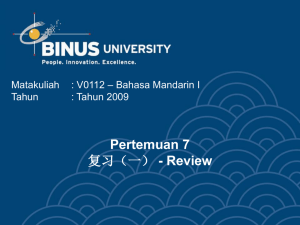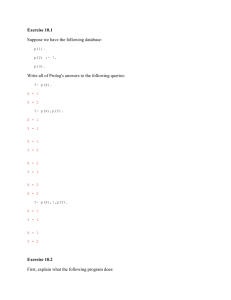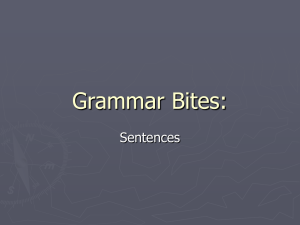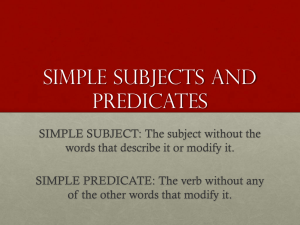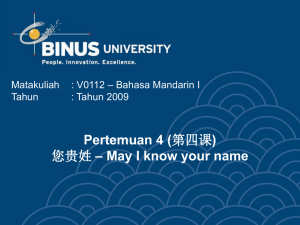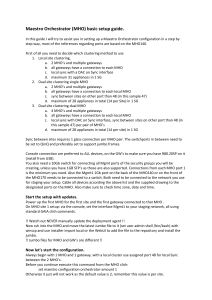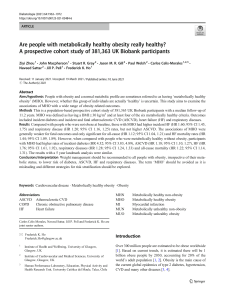Pertemuan 6 – Bahasa Mandarin I Matakuliah : V0112
advertisement
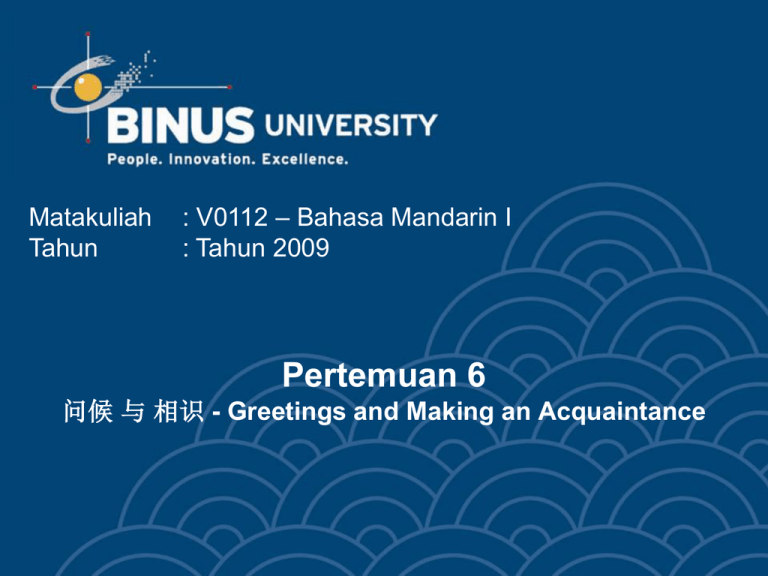
Matakuliah Tahun : V0112 – Bahasa Mandarin I : Tahun 2009 Pertemuan 6 问候 与 相识 - Greetings and Making an Acquaintance 1. 2. 3. 4. 5. 6. 7. 8. 你好! How do you do! Nĭ hăo 你好吗? How are you? Nĭ hăo ma? 很好。 Very well. Hěn hăo 我也很好。 I am very well too. Wŏ yě hén hăo 你早!① good morning! nĭ zăo ! 你身体 好 吗? How are you? nĭ shēntĭ hăo ma? 谢谢! Thanks! xièxie! 再见! Good-bye! zàijiàn 会话复习 Review Conversation 9. 10. 11. 12. 13. 14. 15. 16. 17. 你 工作 忙 吗? Are you busy with your work? nĭ gōngzuò máng ma? 很 忙, 你呢? Yes, very much. And you? hěn máng, nĭ ne? 我 不 太 忙。 I am not very busy. wŏ bú tài máng. 你爸爸、妈妈 身体 好吗? How are your father and nĭ bàba, māma shēntí hăo ma? mother? 我 叫 玛丽 I am Mary. Wŏ jiào Mălì 认识 你 很 高兴。 I am pleased to meet you. Rènshi nĭ hěn gāoxìng. 您 贵 姓? May I know your name Nín guìxìng? 你 叫 什么 名字? What’s your name? Nín jiào shénme míngzi? 他 姓 什么? What’s his name? Tā xìng shénme? 18. 19. 20. 21. 22. 23. 24. 她不 是 老师,她是 学生。 She is not teacher, she is a Tā bú shì lăoshī, tā shì xuéshēng. student. 他 是 谁? Who is he? Tā shì shuí? 我 介绍一下儿。 Let me introduce… Wŏ jièshào yíxiàr 你去哪儿? Where are you going? Nĭ qù năr? 张 老师 在家吗? Is Mr. Zhang at home? Zhāng lăoshī zài jiā ma? 我 是 张老师 的 学生。 I am Mr. Zhang’s student. Wŏ shì Zhāng lăoshī de xuéshēng. 请进! Please come in! Qĭngjìn 林肯答难题 来源:网络 文章作者:佚名 阅读一 点击数:658 林肯在读书的时候,有一次考试,老师问他:“你愿意答道难题呢,还 是做两 道容易的题目?” “答一道难题吧。”林肯很有把握他说。 “那你回答:鸡蛋是怎么来的?” “鸡生的。” “那鸡又是从哪里来的呢?” “老师,这已经是第二道题了。 http://www.6mj.com/news/jizhi/08751052413A9BC34500JC0407E9HH.htm 失败的原因 阅读二 来源:网络 文章作者:佚名 点击数:642 传说有一次,邻人偷了华盛顿的一匹马,华盛顿同一 场里去索讨,但那人拒绝归还,声称那是他自己的马。华 的两眼,对邻人说:“如果这马是你的,那么,请告诉我 是瞎的?” “右眼。”华盛顿放开蒙右眼的手,马的右眼并不瞎。 “我说错了,马的左眼才是瞎的。”邻人急着争辩说。 华盛顿放开蒙左眼的手,马的左眼不瞎。 “我又说错了 ..”邻人还想狡辩。 “是的,你错了。”警官说,“证明马不是你的,必 先生。” 偷马者的失败就在于过份的相信了此马有一只眼睛是 知不觉中上了华盛顿巧设的圈套,等悔悟时,墙脚却早已挖空了。 http://www.6mj.com/news/jizhi/08751051253EIKGB40E1C09F33FH1J.htm 位警察到邻人的农 盛顿用双手蒙住马 们,马的哪只眼睛 须把马还给华盛顿 瞎的前提预设 ,不 语法 1. 用“吗”的问句 Question with “吗” An interrogative sentence is formed by adding the modal particle “吗” at the end of a declarative sentences, e.g 1. 你好吗? 3. 他是老师吗? 2. 你身体好吗? 2. 用疑问代词的问句 Questions with interrogative pronouns The word order of questions with interrogative pronouns (“ 谁shuí”, “什么shénme”, “哪儿năr” and so on) is the same as that of the declarative sentences. Replacing the corresponding part (i.e., the part being questioned) of a declarative sentences with an interrogative pronoun will result in an interrogative sentence, e.g. 1. 他姓什么? 3. 你叫什么名字? 2. 谁(shuí)是大伟? 4. 玛丽在哪儿(năr)? 3. 形容词谓语句 The sentence with an adjectival predicate A sentence with an adjective as the main element of its predicate is known as the sentence with an adjectival predicate, e.g. 1. 他很忙。 2. 他不太高兴。 4. 动词谓语句 The sentence with a verbal predicate A sentence with a verb as the main element of its predicate is called a sentence with a verbal predicate. If the verb takes an object, the former usually precedes the latter, e.g. 1. 他来。 2. 张老师在家。 3. 我去北京大学。 5. 表示领属关系的定语 The attributive genitive 1. When a personal pronoun or a noun is used as an attributive genitive, it generally takes the structural particle “的”,e.g. “他的书”,“张老师的学生”,“王兰的哥哥” and so on. 2. When a personal pronoun is used as an attributive and the headword is a kin term or an institutional one. “的” may be omitted in the attributive, e.g. “我哥哥”,“他姐姐”,“我们学校 ” and so on. 6. “是”字句 The “是” sentence A sentence with the verb “是” and other words or phrases constituting its predicate is known as the “是” sentence. Its negative counterpart is formed by putting the negative adverb “不” before “是 ”, e.g. 1. 他是大夫。 2.大卫是她哥哥。 3.我不是学生,是老师。
